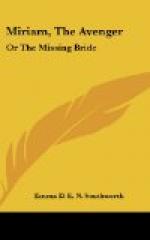The owner in 1814 was Commodore Nickolas Waugh, who inherited the property in right of his mother, the only child and heiress of Peter Kalouga.
This man had the constitution and character, not of his mother’s, but of his father’s family—a hardy, rigorous, energetic Montgomery race, full of fire, spirit and enterprise. At the age of twelve Nickolas lost his father.
At fifteen he began to weary of the tedium of Luckenough, varied only by the restraint of the academy during term. And at sixteen he rebelled against the rule of his indolent lymphatic mamma, broke through the reins of domestic government, escaped to Baltimore and shipped as cabin boy in a merchantman.
Nickolas Waugh went through many adventures, served on board merchantmen, privateers and haply pirates, too, sailed to every part of the known world, and led a wild, reckless and sinful life, until the breaking out of the Revolutionary War, when he took service with Paul Jones, the American Sea King, and turned the brighter part of his character up to the light. He performed miracles of valor—achieved for himself a name and a post-captain’s rank in the infant navy and finally was permitted to retire with a bullet lodged under his shoulder blade, a piece of silver trepanned in the top of his skull, a deep sword-cut across his face from the right temple over his nose to the left cheek—and with the honorary title of commodore.
He was a perfect beauty about this time, no doubt, but that did not prevent him from receiving the hand of his cousin Henrietta Kalouga, who had waited for him many a weary year.
No children blessed his late marriage, and as year after year passed, until himself and his wife were well stricken in years, people, who never lost interest in the great estate, began to wonder to which among his tribe of impoverished relations Nickolas Waugh would bequeath the manor of Luckenough.
His choice fell at length upon his orphan grandniece, the beautiful Edith Lance, whom he took from the Catholic Orphan Asylum, where she had found refuge since the death of her parents and placed in one of the best convent schools in the South.
At the age of seventeen Edith was brought home from school and established at Luckenough as the adopted daughter and acknowledged heiress of her uncle.
Delicate, dreamy and retiring, and tinged with a certain pensiveness, the effect of too much early sorrow and seclusion upon a very sensitive temperament, Edith better loved the solitude of the grand old forest of St. Mary’s or the loneliness of her own shaded rooms at Luckenough than any society the humdrum neighborhood could offer her. And when at the call of social duty she did go into company, she exercised a refining and subduing influence, involuntary as it was potent.
Yet in that lovely, fragile form, in that dreaming, poetical soul, lay undeveloped a latent power of heroism soon to be aroused into action. “Darling of all hearts and eyes,” Edith had been at home a year when the War of 1812 broke out.




